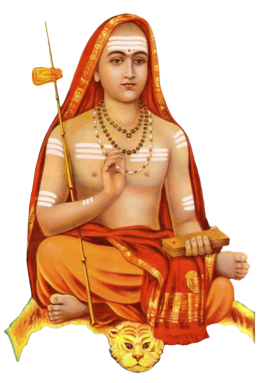चान्नेन जीवति विनश्यति तद्विहीनः ।
त्वक्चर्ममांसरुधिरास्थिपुरीषराशिः
नायं स्वयं भवितुमर्हति नित्यशुद्धः ॥ १५४ ॥
cānnena jīvati vinaśyati tadvihīnaḥ |
tvakcarmamāṃsarudhirāsthipurīṣarāśiḥ
nāyaṃ svayaṃ bhavitumarhati nityaśuddhaḥ || 154 ||
जातक्षणः क्षणगुणोऽनियतस्वभावः ।
नैको जडश्च घटवत्परिदृश्यमानः
स्वात्मा कथं भवति भावविकारवेत्ता ॥ १५५ ॥
jātakṣaṇaḥ kṣaṇaguṇo’niyatasvabhāvaḥ |
naiko jaḍaśca ghaṭavatparidṛśyamānaḥ
svātmā kathaṃ bhavati bhāvavikāravettā || 155 ||
तत्तच्छक्तेरनाशाच्च न नियम्यो नियामकः ॥ १५६ ॥
tattacchakteranāśācca na niyamyo niyāmakaḥ || 156 ||
सत एव स्वतःसिद्धं तद्वैलक्षण्यमात्मनः ॥ १५७ ॥
sata eva svataḥsiddhaṃ tadvailakṣaṇyamātmanaḥ || 157 ||
States—boyhood, youth etc.
कथं भवेदयं वेत्ता स्वयमेतद्विलक्षणः ॥ १५८ ॥
kathaṃ bhavedayaṃ vettā svayametadvilakṣaṇaḥ || 158 ||
वहंमतिं मूढजनः करोति ।
विलक्षणं वेत्ति विचारशीलो
निजस्वरूपं परमार्थ भूतम् ॥ १५९ ॥
vahaṃmatiṃ mūḍhajanaḥ karoti |
vilakṣaṇaṃ vetti vicāraśīlo
nijasvarūpaṃ paramārtha bhūtam || 159 ||
देहे च जीवे विदुषस्त्वहंधीः ।
विवेकविज्ञानवतो महात्मनो
ब्रह्माहमित्येव मतिः सदात्मनि ॥ १६0 ॥
dehe ca jīve viduṣastvahaṃdhīḥ |
vivekavijñānavato mahātmano
brahmāhamityeva matiḥ sadātmani || 160 ||
Mixture of body and soul—The average man thinks he is both body and soul acting in unison.
त्वङ्मांसमेदोऽस्थिपुरीषराशौ ।
सर्वात्मनि ब्रह्मणि निर्विकल्पे
कुरुष्व शान्ति परमां भजस्व ॥ १६१ ॥
tvaṅmāṃsamedo’sthipurīṣarāśau |
sarvātmani brahmaṇi nirvikalpe
kuruṣva śānti paramāṃ bhajasva || 161 ||
विद्वानहं तां न जहाति यावत् ।
तावन्न तस्यास्ति विमुक्तिवार्ताप्य्
अस्त्वेष वेदान्तनयान्तदर्शी ॥ १६२ ॥
vidvānahaṃ tāṃ na jahāti yāvat |
tāvanna tasyāsti vimuktivārtāpy
astveṣa vedāntanayāntadarśī || 162 ||
Erudite .—Mere book-learning is meant. Unless he has realised the state of oneness he will be a mere talker, that is all.
यत्स्वप्नदेहे हृदि कल्पिताङ्गे ।
यथात्मबुद्धिस्तव नास्ति काचिज्
जीवच्छरीरे च तथैव मास्तु ॥ १६३ ॥
yatsvapnadehe hṛdi kalpitāṅge |
yathātmabuddhistava nāsti kācij
jīvaccharīre ca tathaiva māstu || 163 ||
Image-body—the image or reflection of thy body, cast in water etc.
Dream-body—the body that thou mayst assume in dreams.
Living-body—the gross body, with the Pranas etc.
जन्मादिदुःखप्रभवस्य बीजम् ।
यतस्ततस्त्वं जहि तां प्रयत्नात्
त्यक्ते तु चित्ते न पुनर्भवाशा ॥ १६४ ॥
janmādiduḥkhaprabhavasya bījam |
yatastatastvaṃ jahi tāṃ prayatnāt
tyakte tu citte na punarbhavāśā || 164 ||
Vivekachudamani – Introduction
1: Devoted Dedication
2: Glory of Spiritual Life
3: Unique Graces in Life
4-7: Miseries of The Unspiritual Man
8-13: Means of Wisdom
14-17: The Fit Student
18-30: The Four Qualifications
31: Bhakti – Firm and Deep
32-40: Courtesy of Approach and Questioning
41-47: Loving Advice of the Guru
48-49: Questions of the Disciple
50: Intelligent Disciple – Appreciated
51-55: Glory of Self-Effort
56-61: Knowledge of the Self-Its Beauty
62-66: Direct Experience – Liberation
67-71: Discussion on Questions Raised
72-75: Gross Body
76-82: Sense Objects a Trap – Man Bound
83-86: Fascination for Body Criticised
87-91: Gross Body Condemned
92: Organs of Perception and Action
93-94: Inner Instruments
95: The Five Pranas
96-101: Subtle Body – Effects
102: Functions of Prāna
103-105: Ego Discussed
106-107: Infinite Love – the Self
108-110: Māyā – Pointed Out
111-112: Rajoguņa – Nature and Effects
113-116: Tamoguņa – Nature and Effects
117-119: Sattvaguņa – Nature and Effects
120-121: The Causal Body – Its Nature
122-123: Not-Self – Description
124-135: The Self – Its Nature
136: Advice for Self-control
137-142: What is Bondage – The Reply
143-144: The Powers – Agitation and Veiling
145-146: Bondage in Action
147-153: Ātman and Anātman – Discrimination
Negation of the Kośas
154-164: – Annamaya kośa (Food sheath)
165-166: – Prņamaya kośa (Vital air sheath)
167-183: – Manomaya kosa (Mental sheath)
184-188: – Vijnanamaya kośa (Intellectual sheath)
189-191: Ātman – Unattached
192-193: What is Liberation? – Disciple
194-206: Self-Knowledge gives Liberation
207-210: Anandamaya kośa (Bliss sheath)
211: Ātman – Other than the Five Kośas
212: What is Ātman? – Disciple
213-225: Nature of the Self – Discussion
226-236: All Manifestation Absolute
237-240: Brahman – Its Nature
241-249: That Thou Art – Explanation
250-253: Attitude in Meditation
254-266: Aids to Meditation
267-276: Give up Vāsanās – the Method
277-292: End Superimposition – The Means
293-297: The Perceived I’ Factor – False
298-309: Condemnation of the Ego
310-319: Actions, Thoughts and Vāsanās – Renounce
320-329: Total Vigilance – Its Price
330-338: In the One, No Plurality
339-348: Spiritual Growth – the Secret
349-353: Cause-Effect – False
354-372: Samadhi – Its Nature
373-378: Fully Detached – Samadhi Easy
379-383: Meditation – the Technique
384-397: Continuous Attention to Self
398-406: No Diversity in Reality
407-413: Ātma-vicāra – Contemplation
414-418: Give up Perceptions
419-425: The Science of Reality – Its Benefits
426-445: Signs of a Realised Seer
446-464: Prārabdha for a Saint
465-471: There is No Plurality
472-479: Experience of Selfhood
480-520: Practice of Knowledge – Disciple
521-575: Final Words of Advice
576-578: Blessed Disciple Liberated
579-581: The Glory of the Textbook

Vivekachudamani – Verses 154-164 – Vivekachudamani Verses 154-164 – By Adi Sankaracharya – In Sanskrit with English Meaning, Transliteration, Translation, Commenary, Lyrics, Audio – Vivekachudamani-154-164
